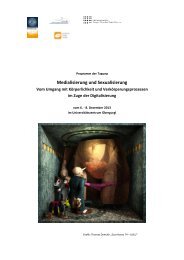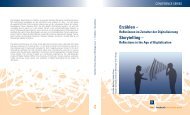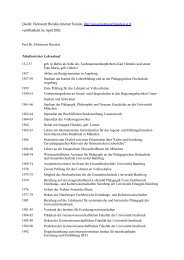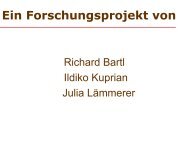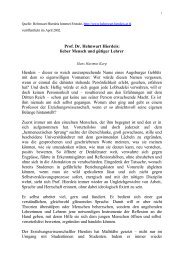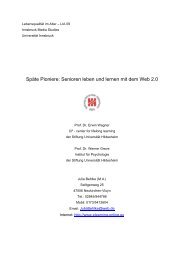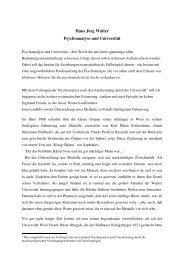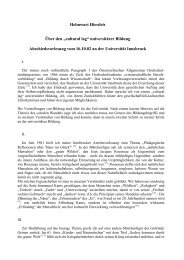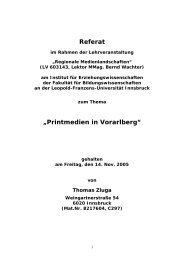Download pdf - Universität Innsbruck
Download pdf - Universität Innsbruck
Download pdf - Universität Innsbruck
Erfolgreiche ePaper selbst erstellen
Machen Sie aus Ihren PDF Publikationen ein blätterbares Flipbook mit unserer einzigartigen Google optimierten e-Paper Software.
74 Manuela Farinosi & Leopoldina Fortunati<br />
“opportunities for moving beyond the mere access to the content (learning<br />
about) to the social application of knowledge in a constant process of re-orientation<br />
(learning as becoming). Social media platforms allow to continue<br />
the interaction outside the classroom and acquire in this way new knowledge<br />
through informal learning and collaborative processes.” (2010, p. 445)<br />
However, the experimentation of these tools inside the education process is at the beginning.<br />
So, it is not surprising that this debate is immature. Many fundamental research<br />
questions such as those concerning the quality of the education outcome after the introduction<br />
of high levels of artificialization and technological mediation may be ignored because<br />
it is too difficult to investigate them at the moment. Current studies generally focus<br />
on the description of the new technological tools introduced in the education process and<br />
of their effects, generally depicted as positive, without making this introduction problematic<br />
in respect to the educational process. They avoid, in fact, asking the true questions:<br />
What are the motivations inside the educational sector that justify the repeated use of these<br />
tools? Which aspects of education as complex activity should be improved through the use<br />
of these tools? As Bruner (1996) reminds us, education is not simply a technical issue of<br />
how to capably manage information processing, but it is a complex activity, aiming at<br />
adapting a culture to the needs of its members and to adapt its members and their ways of<br />
learning to the needs of culture (pp. 55–56). The fundamental point for education is not the<br />
technology, even if this is essential for any culture, but the methodology of research and in<br />
general of mind use (p. 111).<br />
Bruner’s theory of education has to be hybridized with the large, current debate on digital<br />
generation. The term ‘digital natives’ was introduced by Prensky in 2001 to describe the<br />
young people who were born in the late 80s and who grew up in environments saturated<br />
by all kinds of digital technologies. In his vision, this generation is so accustomed to the<br />
new media that their members can be considered ‘natives’ of the digital world, while their<br />
parents, who did not encounter the digital media until adulthood, are considered ‘digital<br />
immigrants’. The eruption of this generation of digital natives inside the education scene<br />
has several consequences. First of all, middle-aged and elderly people, who in the past<br />
were the guides of technological development, are becoming less accustomed to electronic<br />
technology and to the information science of the digital world. Although they have been<br />
using ICTs since they encountered them at a certain point of their life, they find it more<br />
difficult to appropriate themselves than the digital natives. Presky proposes to call them<br />
digital immigrants.<br />
Presky is only one among many scholars and journalists who have created various terms to<br />
express the characteristics of these new generations. Other examples of the labels that have<br />
been proposed are: “Nintendo Generation” (Green, Reid & Bigum, 1998), “Net generation”<br />
(Tapscott, 1998; Oblinger & Oblinger, 2005), “The Millenials” (Howe & Strauss,<br />
2000) and “Generation Me” (Twenge, 2006).



